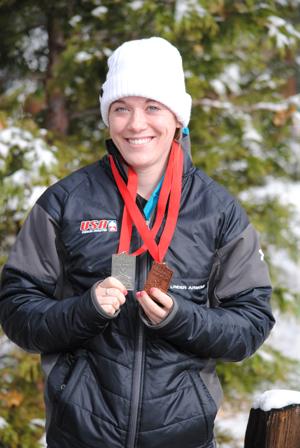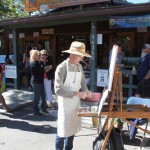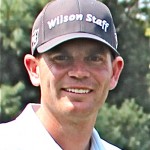
Her most recent competition was two weeks ago in Whistler, Canada, one of the sites of the 2010 Winter Olympics. This is one of the fastest and most treacherous tracks on the tour.
“I’m still sore from my bruises,” she lamented. But Salter was happy to be in Idyllwild and visiting family. This is her first trip home in two years, she said.
Lake Placid, N.Y., is home now to this aspiring Olympic athlete, but she hasn’t been there since late October. In only her third season, Salter has been all over North America participating in American Cup races.
The team left New York for Park City, Utah, where they continued training. From there she and teammates drove to Calgary for November races, then back to Park City and then to Vancouver and Whistler.
The skeleton, luge and bobsled are three winter sports where competitors ride a sled down a mile-long ice track. The walls are ice. All three sports involve skill, strength, and speed and are practiced by both men and women.
Skeleton is a solo sport and racers lie face down and face forward on the sled. The luge competitors ride the sled feet first and get a push start. Skeleton racers begin with a running start.
At the Whistler track, where Salter finished fifth, she attained speeds faster than 80 miles per hour. “This was a whole different experience,” she said. “Pretty awesome just going that speed.”
This is the same track where Nodar Kumaritashvili, a luge competitor, crashed and died during a training run on the first day of the 2010 Winter Olympics.
But Salter says racing is becoming more natural for her. The technical aspects are becoming easier, she said. And skeleton athletes, just as in football, basketball and other big money sports, study the tapes too.
While practice slides may take two to three hours a day, most of that time is waiting and watching teammates. The actual slide time is less than three minutes a day. But her coach tapes runs and has the team study the tapes, particularly the tougher turns for hours a day.
And then she has to have time for workouts, including weightlifting. Time must also be allocated for equipment maintenance. This includes polishing the sled’s runners to minimize friction on the ice.
“We look at our entrance and exit of each turn,” she said. “We have to learn quickly, especially at Whistler, which is the Canadians’ home track.”
While she has done well in these international competitions, Salter said the second half of the season is still undetermined. “The coaches like to shuffle people and haven’t made a decision,” she said.
But she is feeling confident having been in four races this year, her first in regular international competitions. And she was asked to make all the runs at Whistler, where injuries are common, but her coaches believe she is a responsible slider. Most of her teammates have seven to eight years of skeleton experience.
“I didn’t believe the coaches when they said, ‘It’s a sport of time.’ That means racing and learning about all the tracks,” she said.
After the last 2012-13 American Cup race in March, Salter will begin training and preparation again for the 2013-14 season. She spends the summer in Lake Placid, running, training, working out, studying and trying to earn money to allow her to achieve her Olympic goal.
“Being an Olympic hopeful is pretty wild,” she said. “I didn’t think about until I was racing and on the stand and saw the USA signs. It was not just me, but for my country.”
For those who can help Lauren, here is how:
- To contribute online, go to USBSF Athlete Training Fund at www.teamusa.org/USA-Bobsled-and-Skeleton-Federation/Resources/For-Athletes/Athlete-Training-Fund/Donate-Online.aspx
- To mail a check, please make it payable to “USBSF – Athlete Training Fund” and send to the following address: Attn: Shannon Nelson, U.S. Bobsled & Skeleton Federation, 1631 Mesa Ave., Copper Building, Suite A, Colorado Springs, CO 80906.
Please include a brief note and identify the contribution for Lauren Salter.
Donations or sponsorships of $1,000 or more will get their name or company logo on Salter’s sled or helmet for the 2nd half of the 2012-2013 sliding season.










